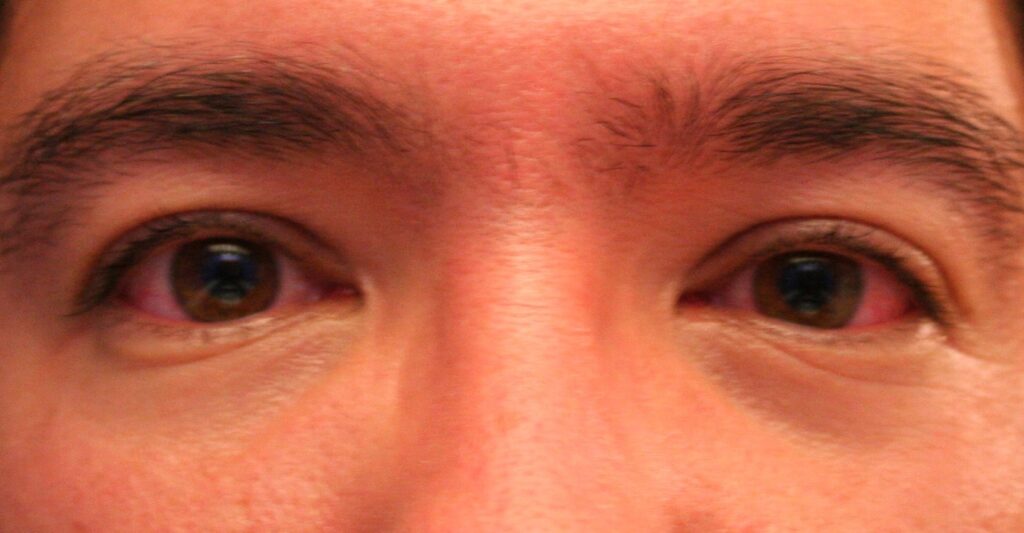Itchy, watery, and red eyes can be a source of significant discomfort and disruption. This condition, often referred to as red eye, occurs when the small blood vessels on the surface of the eye become swollen or dilated. While there are numerous potential causes, common culprits include environmental irritants and allergic reactions. Here’s more information on treating red eye symptoms:
What Is Causing Your Red Eyes?
When allergens are the cause of your red eyes, the condition is known as allergic conjunctivitis. This is an inflammation of the conjunctiva, the thin membrane that covers the white part of your eye and the inside of your eyelids. This inflammation is your body’s response to a substance it perceives as a threat, triggering an immune response that leads to redness, itching, and swelling. In addition to red eyes, you may experience other related allergy symptoms, like:
- Itching and Watering Eyes
- Sneezing
- Swelling Eyelids
- Running Nose
- Itching Throat
Seasonal Allergies
Allergic conjunctivitis is categorized based on the type of allergen and the timing of your symptoms. Seasonal allergic conjunctivitis typically occurs during specific seasons. It is caused by exposure to airborne allergens like pollen from trees, grasses, and weeds. Symptoms may worsen on days with high pollen counts.
Perennial Allergies
Perennial allergic conjunctivitis persists throughout the year. Perennial allergies are triggered by indoor allergens, like dust mites, pet dander, mold, and cockroaches. Symptoms may be chronic but can vary in intensity.
What Are Some At-Home Treatments?
For mild or occasional symptoms, several at-home strategies can help alleviate symptoms. A simple approach is to apply a cold compress to your closed eyes for several minutes, which may help reduce swelling and soothe irritation. Wearing sunglasses outdoors can also help shield your eyes from airborne allergens like pollen.
Over-the-counter lubricating eye drops, often called artificial tears, can help flush out allergens and provide temporary relief from dryness and irritation. Avoiding known allergens is a fundamental step in managing your symptoms. This may involve keeping windows closed during high-pollen seasons, using an air purifier indoors, and washing your hands frequently, especially after touching pets.
What Are Some Professional Treatments?
If at-home measures do not provide adequate relief, or if your symptoms are severe and persistent, contact a healthcare professional. A specialist can perform tests to identify the specific allergens causing your reaction and suggest a more targeted treatment plan. Some medical professionals who can diagnose allergies and eye conditions include:
- Allergists
- Optometrists
- Ophthalmologist
Diagnosing
A thorough evaluation process typically begins with a detailed discussion of your medical history and symptoms. This includes the frequency of occurrence, possible triggers, and their severity. Providing information helps your provider identify patterns and establish a baseline understanding of your health.
Professionals may also conduct a physical examination of the eyes, checking for redness, swelling, discharge, and other signs of irritation or allergic reactions. Depending on the situation, further diagnostic tests might be performed, like a slit-lamp exam to examine the structures of the eyes in greater detail. Skin prick tests may be recommended to identify specific allergens.
Treating
Professional treatment options may include prescription eye drops containing antihistamines, decongestants, or mast cell stabilizers. These factors work to control the allergic reaction. For individuals with chronic and severe allergies that do not respond well to standard treatments, allergy immunotherapy may be recommended. Immunotherapy is a long-term treatment option. It involves administering gradually increasing doses of an allergen to help your immune system become less sensitive to it over time. Immunotherapy can be delivered through injections (allergy shots) or under-the-tongue tablets.
Schedule an Appointment
Persistent red eyes can interfere with your daily life and may be a sign of an underlying condition that requires professional evaluation. If your symptoms do not improve or are accompanied by pain, changes in vision, or significant discharge, seek medical advice. Scheduling an appointment with an allergist or ophthalmologist can provide you with a precise diagnosis and a comprehensive treatment plan. Learn more about your allergies today, and schedule an appointment.

